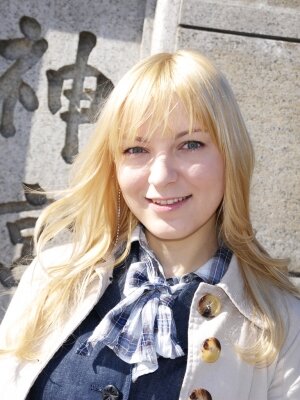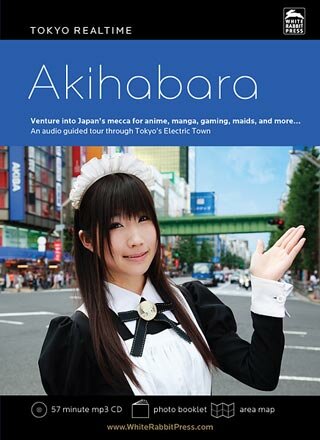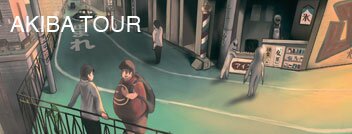 Filed under: Otaku Seiyuu International
Filed under: Otaku Seiyuu InternationalOtaku2 Interview: Jenya
15.06.2010 by Patrick W. Galbraith
Many anime fans already have heard of Jenya (じぇーにゃ), a young Russian lady making her was in the world of Japanese seiyuu. I first saw Jenya on the Foreigner Akiba King Championship in 2007, where she placed second. Impressed, I kept on eye on her, watching as her career took off. We often crossed paths in Akihabara, not unexpected, as she was working as a maid as the . I finally got a chance to sit down and talk with her for a Metropolisinterview. This is the extended manuscript.
PG: Where are you from?
J: The Russian city of Novosibirsk.
PG: What did you want to be growing up?
J: I wanted to try many professions. I wanted to be a hairdresser, a Russian language teacher, TV star, radio DJ, singer, journalist... Well, most of them came true, except the first one, maybe. I like to get attention and to speak. That's the thing that didn't change through all these years.
PG: When did you come to Japan?
J: I came to Tokyo to stay and live here in July 2005. After graduating university as an IT-capable economist, I realized that this is not what I wanted to do. I wanted to do something involving Japanese animation. I wanted to give my voice to it - as voice actress and singer.
PG: How did you you get into the industry?
J: At first, I was in a little private agency, but soon I realized I couldn't get enough jobs being there, so I went freelance and worked as a "free talent" for a year while looking for a "real" agency. I met with the Media Force agency for a recording in August 2008, and was accepted there in September. Since then, I get more jobs and my dream finaly came true - I got to do anime voices! You see, you can't get anime or other roles working freelance. All the auditions and job requests come to the agency first. Of course, if you are a big name already, you can work as a "free actor," too, but if you are just a rookie, then you need an agency to get jobs.
PG: You are well known for your otaku hobbies. When did you get into that?
J: My first agency tried to make me popular, using my love for anime. I like anime, I watch it, but I don't think I am that much of an "otaku." Anime is my job now, and I am watching much less anime than in years past. I don't have figures or anime posters at home, I almost never read manga. Well, I have a lot of knowledge about seiyuu and have a list of favorite seiyuu, but that is part of my job. I think, my view of the meaning of the word "otaku" changed these years living in Tokyo. Still, I think otaku is a person who truly loves anime, or manga, games, characters or anything, and try to confess his love some way or another. This person may collect DVDs or figures, which is his form of love, or may create Nico Nico videos, or may get a dream job like me. I don't think otaku are bad. Otaku people have enough courage to admit that they are otaku.

PG: So you aren't as into it now, but what got you into anime?
J: When I was 17, i saw "Sailor Moon" on a Russian TV channel. I immediately fell in love with the show, and was watching every episode. I didn't have a PC or Internet access back then, so I tried to find "Sailor Moon" friends through newspaper ads. It was sort of like the way BBS work now. I also established an anime club in my home town and was its president for a few years. We exchanged video tapes with other city's otaku, created our own small events. We didn't have anime in Russia back then at all, and it was me and my friends throughout Russia who spread anime culture nationwide. When I got my own PC and dial-up connection, I made a home page. That is how I was discovered by Japanese fans.
PG: You are doing voice work now, but did it take a while to reach that level?
J: I was involved in anime productions before I was able to do voice work. Actually, before I even moved in Japan, I was already helping with the Russian language for the "Black Lagoon" manga. That was back in 2004. After that, I started working on anime. I helped with the Russian pronunciation there, too. But since I wasn't in a proper agency and didn't have enough experience, I didn't get any voice work. But somehow, through many wonderful coincidences, working on this manga finally led me to the "Evangelion" job [as the voice of a staffer at Nerv]. That was my debut role. At first, I was pretty nervous. I got to work with some really famous and beloved voice actors, like Paku Romi (Edward Elric) or Hirano Aya (Suzumiya Haruhi). But now i just feel happy when I meet those famous people. I am happy to be able to work with them, and have a lot of respect for them. That never changes.
PG: What's the secret to your success? How can other people out there follow in your footsteps?
J: I don't really feel that I have succeeded yet. Yes, I debuted and have done some little roles, but I am just at the very beginning. But still, there are two main things that helped me to achieve what I have. The first one is that I didn't give up. There were, and still are, a lot of times I just want to give up. But I can't. Because there is the second thing - people who believe and support me. It's like, "We believed in you, and what, you just quit?" I spent 10 years of my life trying to get this job. I can't quit and let down all the people, my friends and fans. I know it sounds so "idol-thanks-her-fans," but it is the truth. There are people who have supported me since I first came to Japan, and I am very thankful to them every day for my being here.
PG: How are the fans?
J: There are some old fans who became my friends. There are also new fans, who have come to know me lately, when I became somehow a bit more of "a star" than I was before. I am on TV sometimes, and now I am actually voicing anime characters, so I may have become a little bit distant. I am not replying to comments on my blog - I can't answer everyone - but sometimes I can answer some mails or messages. I am not doing any events, either, so I am not all that easy to meet these days. But I am very easy to recognize on the street. So sometimes some people recognize me, and I am very thankful to them and always say thanks. Especially I am glad when I meet female fans. I don't care if my fans are otaku or not. Sometimes people tell me, "Sorry, I don't know much of anime, but I like you." And even if someone is an otaku fan, that just means that we can understand each other more easily, since we like the same anime and games!
PG: What do you like best about your work now? What do you like least?
J: The best thing is that I meet a lot of really famous and talented people from the anime world. Not only seiyuu, but also directors, writers and animators. There is so much to learn from them! And everyone is really kind to me. Maybe it's because I am a foreigner, or maybe it's because they can feel that I really did come a long way to get here. I also love being involved in things from the beginning. It's like in an RPG game, when you're not a beginner anymore, but you still have to gain 10 more levels to be any good. This is when the process is the most fun! The worst thing is that I can't speak Japanese as well as I want to. My Japanese is really good, especially my pronunciation, but it is not perfect. I have high standards for myself, and voice actors also have high standards. I want to meet the expectations. I have to learn not only the language, but what is hiding beneath it - the Japanese way of life. Japan is pretty different from Russia and any other country. I am afraid of being unpolite to someone by not knowing when I do something wrong. So I am learning and trying to become a better person.
PG: What are your goals from now?
J: I want to sing! I love to sing. I want to sing something like an anime opening theme, release a solo album and so on. I know I am not that good as a seiyuu yet, but you don't have to speak perfect Japanese to sing. I have released some indies CDs and songs, but I want to make a major solo debut. That is my goal for 2010. And, of course, more anime roles!


Comment on this article

19.09.2010 · Blog
'Hardware Girls' launch party
A photographer and journalist, gravure idol and musician, it is tough to pin down Julie Watai, aka Amano Ai, aka Eye Taso. She is as...
24.07.2010 · Features
Storywriter Sato Dai is frustrated with Japanese anime
Rips on the industry at academic conference
24.07.2010 · Blog
Michael Arias, an American making anime
As part of the Summer Institute of Studies in Japanese Popular Culture, Temple University Japan Campus had a guest lecture by Michael Arias...
01.07.2010 · Features
Momoi Halko: The voice of moe is surprisingly deep!
Interview excerpts and random thoughts
07.06.2010 · Blog
Sucked into the Black Hole AKA 4chan
We just received an "Anonymous" email informing us of Patrick's debut over at 4chan's Otaku Encyclopedia thread. Guess I'll have to sift...
30.05.2010 · Blog
The Politics of Popular Culture
Temple University Japan will be holding two conferences on Japanese popular culture as part of the maid cafes. Each event is 1,000 yen,...

31.03.2010 · Blog
On the prowl for banned goods
I visited an underground collector in Koenji who had literally rooms full of books, CDs and items that had been banned in Japan. He also...
Read on... 0 Comments
25.03.2010 · Blog
Sexy legs, no faces
Just walking through Akihabara and saw this sign for an independently produced erotic video. It is of the sentai-hentai variety, or mixing...
22.03.2010 · Blog
Nippombashi Street Festa 2010
I shot over to Osaka for the Nippombashi Street Festa 2010. It was the sixth annual event, and by all accounts was a little more organized...
07.03.2010 · Blog
Yamakan as 'girls anime'
I have a few issues with this issue of "Spoon," a women's magazine that ran a special on "Women's Anime 2010." It is mostly about "Eden of...

























1 CommentComment Page 1 of 1
grandma lover wrote on 07.8.2010:
I'm so glad she stopped wearing the cardboard like skirt!^^
good job on the interview!